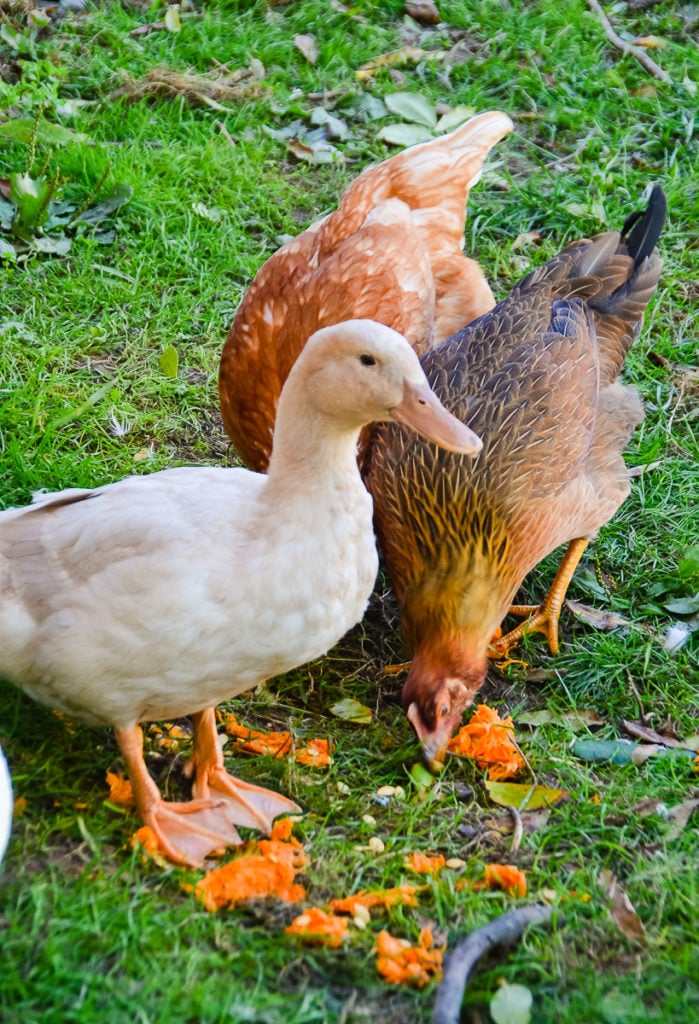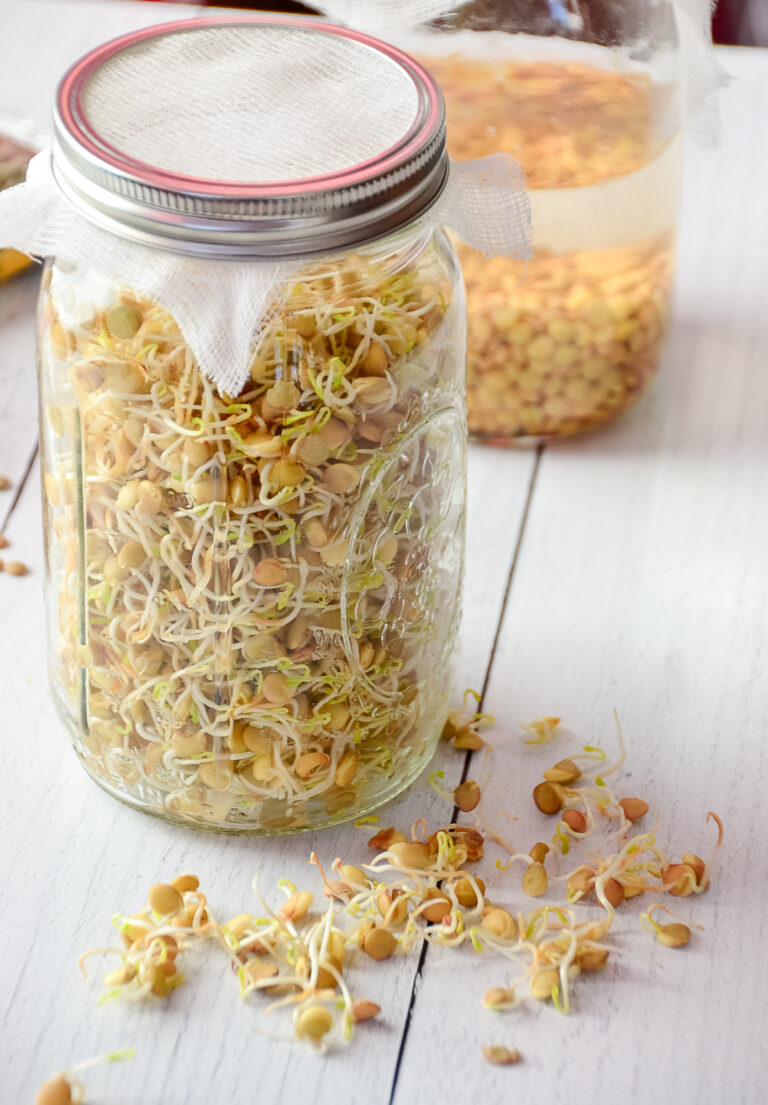Coop Cohabitation: Can Chickens and Ducks Live Together?
Domestic ducks can peacefully cohabitate with backyard chickens. Duck and chickens basic feed and shelter requirements are very similar, which makes it possible for them to be coop mates, but there are a few considerations that you will need to keep in mind when adding waterfowl to a chicken coop.

I have been raising my ducks and chickens together in the same coop for quite a while now, and it has definitely been one of those learn as you go experiences! If you are considering expanding your backyard flock by adding ducks, housing them together in the same coop does make a lot of sense, their basic needs are actually very similar.
Housing
I house my mixed flock in a shed that has been converted into a chicken coop. My coop sits on a concrete slab, has a window and large ground level door. While my coop isn’t perfect, it has worked well for my flock. I like to collect coop ideas and inspiration on PInterest to help me better accommodate my flock, and apply DIY modifications as needed. I constantly keep my eye open for new or different ideas to make changes or additions to my flock’s living spaces.
While chickens and ducks shelter requirements are similar they are not identical.

Chickens need a place to stay dry, warm, and also to keep cool. A coop that is insulated, ventilated, and provides perches and nesting boxes are all equally important. Coops can be easily constructed out of recycled wood, purchased brand new, or found on craigslist.
Ducks are lower maintenance than chickens when it comes to housing. Because ducks are generally hardier than chickens, simple housing (think lean-to or even a dog house) is sufficient as long as it is in a secure location that protects them from the elements.
Some things to keep in mind when planning your coop space for a mixed flock:
- When bringing new flock members into your coop, you also need to ensure that you have an appropriate quarantine space to keep the new additions and your existing residents safe!
- Keep in mind that it’s best if the entrance to a duck’s indoor living space is at ground level, or very close to it. Ducks do not navigate steep ramps well.
- Both ducks and chickens are very vulnerable to predators, especially overnight. Because of this, the coop should be closed at dusk and the flock should not be let out again until the sun is coming up in the morning. You may also consider adding gadgets to help boost the security of your coop.
- Proper coop ventilation is crucial. A mixed flock will generate lots of water vapor, from both their breath and droppings, and all this water vapor tends to make coop air humid. High humidity (particularly in cold weather) makes chickens more susceptible to respiratory illness and frostbite. Good ventilation will remove this dampness and humidity from the coop.
- No matter what your coop looks like, make sure to not overcrowd your coop.
Skimping on space requirements for a mixed flock will cause stress, bullying, and may lead to health issues. The minimum spacing is below a good reference, for flocks that spend most of the day free-ranging in a yard or protected pasture. Confined flocks will likely need much more coop space.
- The minimum space necessary for each mature laying duck in your coop is three square feet.
- The minimum space necessary for each mature laying chicken is about 2 to 3 square feet per chicken inside the chicken coop.
- Provide enough perches so each chicken has 12 inches of space on the perch.
Water
Water will likely become your biggest pain point when raising ducks with chickens in the same coop, especially if you plan on utilizing the deep litter system in your coop.
Ducks need water to eat and keep themselves clean!
Ducks eat by grabbing a mouthful of food, and then dunking their bills into the water and swishing it around. Aside fron eating, ducks love to splash, throw water around, and generally make a muddy mess, and surprisingly they can do it with a very little amount of water.
Chickens, on the other hand, prefer to stay dry at all costs. There’s a reason the expression “madder than a wet hen” came into being! Unlike ducks, chickens do not have waterproof feathers that keep them dry and warm.
During the summer months I combated the duck’s water mess by keeping waterers completely out of the coop to ensure that the area used by both the chickens and ducks for sleeping, protection, and nesting will remain clean and dry. Ducks can go overnight without food or water, and a damp, dirty, enclosed space is a breeding ground for bacteria. Keeping the water and kiddie pools outside of the coop worked well when the weather was mild, but when fall turns to winter, freezing temperatures present a different problem.
Ducks are more cold hardy than chickens. Ducks are happy to be out in the snow briefly to explore during the day. Generally speaking, chickens don’t like snow, and prefer their food and water nearby in the comfort of the coop. Moving the waterer back into the coop, so the chickens don’t avoid going out into the snow for a drink kept the hens happy, but the ducks created cold wet messes around the waterers.
I attempted a few diy water reservoir solutions, and I am currently placing the waterer on two bricks in a hog pan to capture a lot of the spray and water dribbles ducks make when they get a drink. The waterer in a hog pan is helping keep the coop much drier, but makes more work for me during chore time as I have to empty it every morning.
Another issue I ran into when housing chickens and ducks together in the same coop, was that one of my ducks protected the water, and would chase chickens looking for a drink away from the water. I’m not 100% certain this is typical duck behavior, but it happened in my coop, so I’d keep an eye out for any similar behavior.

Food
A mixed flock of adult chickens and ducks can be fed regular chicken layer feed, and generally speaking, both chickens and ducks will do quite well when allowed to free-range. Of course, there is some variation in foraging ability among different breeds of chickens and ducks, but for the most part, both species of poultry will enjoy wandering around the yard looking for snacks.
Both ducks and chickens will self regulate the amount of food they eat, so food can be left out in a hanging feeder all day for free choice. Apple cider vinegar and garlic have long been thought as having numerous health benefits for supporting a strong immune system for people, pets and livestock, and can also be offered to your mixed flock.
Ducks do require slightly higher levels of niacin than chickens, and in my opinion, benefit greatly from a healthy amount of fresh foods in their diet. A sprinkling of Brewer’s yeast and supplying them with their favorite Niacin rich treats is an easy way to prevent problems in ducks due to niacin deficiency.
When I first started raising ducks, our ducks were allowed to free range and forage for food at a small creek, but due to the surroundings of the creek we were unable to protect them from predators. The creek became so problematic the ducks stopped visiting their only natural body of water.
In an attempt to replicate the fresh greens and plant food sources the ducks were enjoying on the creek, I started feeding the ducks a smorgasbord style meal twice a day that consists of defrosted frozen peas, mealworms, cracked corn, layer feed, and lately a little bit of pumpkin or squash. The ducks are healthy and happy, and don’t seem to mind sharing a little bit of their morning and evening meals with the chickens.

Sleeping Arrangements
One of the things that makes housing ducks with chickens so appealing, is that they don’t compete for sleeping space.
Chickens prefer to roost. Many people use a 2 x 4 board installed about 18 inches off the ground as a roost for the chickens to sleep on. The 2×4 is ideal because when installed with the 4 inch side is flat for the chickens to perch on they can comfortably cover their own feet with their feathers during cold weather, and appeals to the chickens natural desire to perch at night to avoid predators.
Ducks like to choose their own spot for sleeping, but they are perfectly content to snooze on some soft straw or shavings strewn about on the floor in the corner of the coop.
My ducks seem to enjoy the sense of an enclosed sleeping space, and tended to want to nest down under the chicken’s perch, which led to them getting pooped on. To prevent the ducks from sleeping under the chickens perch you can close off the area with chicken wire.
Nesting Boxes
It’s said that ducks rarely use nesting boxes, but my ducks enjoy using the ground level nesting boxes I provided for my chickens to lay eggs in.
Although, the chickens didn’t seem to be enthusiastic about sharing a nest box and started laying eggs on the floor of the coop briefly. I have my suspicions that the ducks were also sleeping in the nesting boxes, but ducks are early risers and lay their eggs long before the chickens are up for the day. After about a week the chickens seemed to get over their initial dislike of sharing nesting boxes, and resummed laying eggs in their favorite nesting boxes.
Behavior
Aside from the water guarding stunt that ducks like to pull from time to time, I haven’t run into any serious behavioral issues when it comes to housing my all female flock of chickens and ducks together.
I feel chickens and duck interactions can best be summed up with “they don’t seem to like each other, but they don’t dislike each other”. My ducks and chickens typically hang out together as one big mixed flock thoughout the day, but it’s obvious they are 2 seperate flocks that enjoy being near each other .
The ducks aren’t interested in taking part in the chicken’s pecking order nonsense, and the chickens are content taking part in their own chicken society, excluding the larger birds that sleep on the floor.
As long as you don’t have a highly aggressive bird, and have adequate space in your coop, I don’t think it is likely that there will be problems.
Interestingly, my ducks did pick up a daily habit from the chickens, and do follow them into the coop when the day starts to turn to dusk. I’m not going to lie, I don’t miss herding the ducks into the coop every night.
Predator Protection
Predators are an ever-present threat for every poultry owner. In my area I have a very hard time with foxes, but you may have different threats to your flock depending on where you live.
Both chickens and ducks are highly susceptible to predators, but ducks are much more vulnerable to land based predators such as fox, coyotes and raccons than chickens. Flightless ducks, with their big flippers and large bodies move cumbersomely on dry land and aren’t able to escape predators who will attack on the ground. Physical barriers will be one of the most useful predator protection you can offer your mixed flock.
Barriers should include a fence at least 5-6 feet high, and a 12” trench all the way around the perimeter of the coop and run with buried wire mesh hardware cloth to prevent predators from digging under. An alternative to a trench is to extend a 12” apron out from the perimeter. An apron isn’t as effective as a trench, but will provide some measure of security from digging predators such as foxes.
When your flock is out in a pasture a solar powered electric fence is a good way to keep them contained in a specific location, and protected from predators.
Although ducks aren’t at too much risk from attacks by hawks or other aerial predators because of their larger size, attacks from raptors are common amoung chicken flocks. The best protection from hawk attacks is a chicken run that offers 360o protection, that includes a netting or wire canopy. If you like to let your flock free range, make sure your property has plenty of “hiding spots” for the chickens to tuck into when they feel threatened by an overhead predator. Hiding spots can be shrubby bushes, half barrels, wooden pallets on cinder blocks, or anything that can provide easy access overhead shelter to your flock.
Roosters and Drakes
If you are going to keep a mixed flock, you might want to keep drakes (male ducks) or Roosters (male chickens). If your sole purpose for keeping a mixed flock is egg production, you may never need a rooster or drake at all, in fact I will never have a drake in my flock long term ever again. But if your flock goals include breeding ducks, you will need a drake.
Both roosters and drakes can serve a purpose in your flock, but there situations you need to be aware of and monitor for to help you keep your flock healthy and happy.
Male ducks have very high sex drives, they also can be very rough on females. If you keep multiple drakes, mating can be down right horrific, because often when one male notices another male mating the others will run/swim over to join in while the female is restrained. This can result in the female duck getting injured. Missing feathers from the neck, head, and back, along with large to small cuts from the drake’s claws or bill, or even death can happen when a female is over-mated.
Drakes may even attempt to mate with chickens, which can be highly problematic. Waterfowl are one of the few birds that actually have penises. Drakes have long corkscrew mating organs that stay tucked within the duck’s body until it’s time to mate.
Rooster’s on the other hand do not have penises, nor is the female chicken reproductive tract designed for penetration. A drake attempting to mate with a hen is very dangerous for the hen and can actually kill her.
If you do decide to keep a drake in your flock to fertilize duck eggs, keeping a rooster to protect the hens is highly recommended. Rooster’s seem to share the hen’s lack of interest in ducks, and I have never had any issues with a rooster in a mixed flock. That’s not to say it’s impossible, I’ve ran across my fair share of ornery roosters. But bad-tempered and combative roosters don’t have a place in my flock, and will ultimately end up in the stew pot.
Raising chickens and ducks together is a fun experience, and ducks add a lot of personality and character to a backyard flock. It is totally possible Chickens and Ducks Live Together in the same coop.








This is a very helpful article. Thank you!